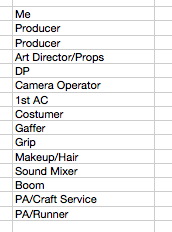I was happy to get such a strong reaction since [posting](http://johnaugust.com/archives/2009/the-remnants-in-full) the pilot for The Remnants. Every few days, we get a surge of hits as new sites link to it. A fan even set up [Draft The Remnants](http://drafttheremnants.com) to get people to pledge their love.
For something that’s been sitting on a shelf for a year, it’s really gratifying.
Viewers had a lot of questions, so I’ll do my best to answer them here.
It’s actually not about zombies.
===
When I pitched the show, I described it as a cross between The Office and The Stand. Something Very Bad has happened, but we’re focusing on the survivors and their dysfunctional attempts to reestablish normalcy. Like Stephen King’s book, there are good people and some very bad people — but they’re not the living dead.
I completely understand why viewers might expect some shambling corpses. Mia claims that she’s “not one of them,” and former group member Stan apparently “went Jurassic Park.” The bad people, “them,” are truly scary — but also incredibly organized and sneaky. Think fascist.
Think V, not Z.
In the final scene, Mia and Josh both admit they don’t really understand what happened. That’s important.
MIA
I don’t know if the world got invaded, or if this is something we created ourselves...
JOSH
It’s nano-technology from the future.
MIA
Really.
JOSH
I have no idea.
The correct answer is an amalgam of all three.
How did you get that cast?
===
I knew Ben Falcone and Justine Bateman, so I wrote those parts with them in mind. Ze Frank is a friend of producer Matt Byrne, and I had a hunch he could act. So I wrote the part hoping he’d do it.
Robert Ulrich, who’s been my casting director on several projects, graciously agreed to help me find actors for Chas, Mia and Wallace. You’d think that given my credits, it would be easy to get people in to meet and/or audition, but several agencies simply refused to send their actors out for a web series. ((Props to William Morris and ICM for taking us seriously.)) I deliberately hired people with a writing or improv background, because I knew from shooting Part Two of The Nines that I’d need to let people veer far off the script in order to get the feel I wanted.
Because Justine is very active in SAG, she got us to test out their new web series agreement, which basically allows guild actors to work on experimental projects like this for less than scale. From cast to crew, everyone got about $120/day.
How long did you shoot? How much did it cost?
===
We shot three pretty easy days, with most departments getting a day to prep and a day to wrap. With six actors and a fair amount of improv, I didn’t want to feel rushed. We shot two cameras (the HVX-200) most of the time, generally gunning the same direction for a wide and a close-up.
 All in, the show cost $25,003. Depending on your perspective, that’s either expensive for a web show or mind-blowingly cheap for television show. We paid for locations, permits and other details a scrappier web show would just ignore. And we had more crew. Some web shows are literally just the actors and a guy holding the camera. We had 15 people. We were more like an indie feature, but without trucks or trailers.
All in, the show cost $25,003. Depending on your perspective, that’s either expensive for a web show or mind-blowingly cheap for television show. We paid for locations, permits and other details a scrappier web show would just ignore. And we had more crew. Some web shows are literally just the actors and a guy holding the camera. We had 15 people. We were more like an indie feature, but without trucks or trailers.
We could have done it cheaper. Of the $25,000, more than $17,000 went to pay people, and a lot of those folks probably would have worked for free. But I didn’t want to do anything I couldn’t replicate for a series of 10 episodes. You can’t ask someone to work for 25 days for the love of their craft.
I saw the pilot as an experiment not just in storytelling, but production. I wanted to it to be sustainable.
Why isn’t this a web series?
====
There are at least five answers, all of which are obstacles.
* **The lack of a major advertiser who wanted to sponsor it.** That was the original goal: to find a company that would promote the show as hard as we would promote their product. Pringles is sort of a placeholder. We could swap that out for almost anything: Coke, Ace Hardware, Duracell.
* **Actor availability.** Every actor in The Remnants works a lot. The writers’ strike was a major reason why so many great people were available. And no, I’m not wishing for an actors’ strike.
* **My schedule.** I don’t know when I could do it. I haven’t announced the post-Shazam projects I’m working on, but trust me, I’m really busy with features. Doing ten episodes of The Remnants would be three solid months of work.
* **The lack of a viable business model.** A series of ten similar webisodes wouldn’t cost that much (maybe $300K), but there’s still no model for how investors could get their money back. If I thought there was, I’d pay for it myself.
* **My ambitions.** I need to write another movie to direct. The more things I put in front of it, the longer it pushes off that goal.
All this said, I’ve been thinking a lot about The Remnants, and have mentally moved it from the “Impossible” to “Unlikely” box.
What happened at the Grand Canyon?
===
Something so awful it still gives me nightmares.
(That’s the answer I gave actresses when they asked that question in auditions.)
The Remnants from John August on Vimeo.


